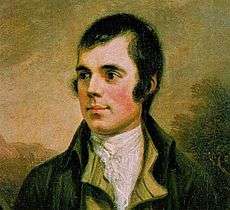Oh, whistle and I'll come to you, my lad
Oh, whistle and I'll come to you, my lad is the title and refrain of a 1793[1] poem and song by Robert Burns.
In popular culture
In 1904 it was used as the title of 'Oh, Whistle, and I'll Come to You, My Lad' in the book Ghost Stories of an Antiquary by M. R. James in which a man digs up a bronze whistle in a possible Templar preceptory near Burnstow, a fictionalised version of the town of Felixstowe in Suffolk. The whistle has two phrases inscribed on it in Latin; FLA FUR BIS FLE[2] and QUIS EST ISTE QUI VENIT.[3] His blowing it has unexpected consequences.
Whistle and I'll Come to You is the title of two different BBC adaptations based on the work, one in 1968 and one in 2010. Both adaptations use James' story as a basis, but alter a number of aspects of the tale.
The phrase "Quis est iste qui venit" is also referenced in the survival horror video game Silent Hill: Shattered Memories, written on a cabin in the town with the same name.
References
- ↑ http://www.robertburns.org/works/424.shtml
- ↑ Pardoe, Rosemary (August 24, 2007). "(11) What's the meaning of the "FUR/FLA/FLE/BIS" inscription in "Oh, Whistle, and I'll Come to You, My Lad"?". M.R. James Frequently Asked Questions. Retrieved 15 January 2011.
- ↑ Isaiah 63:1
